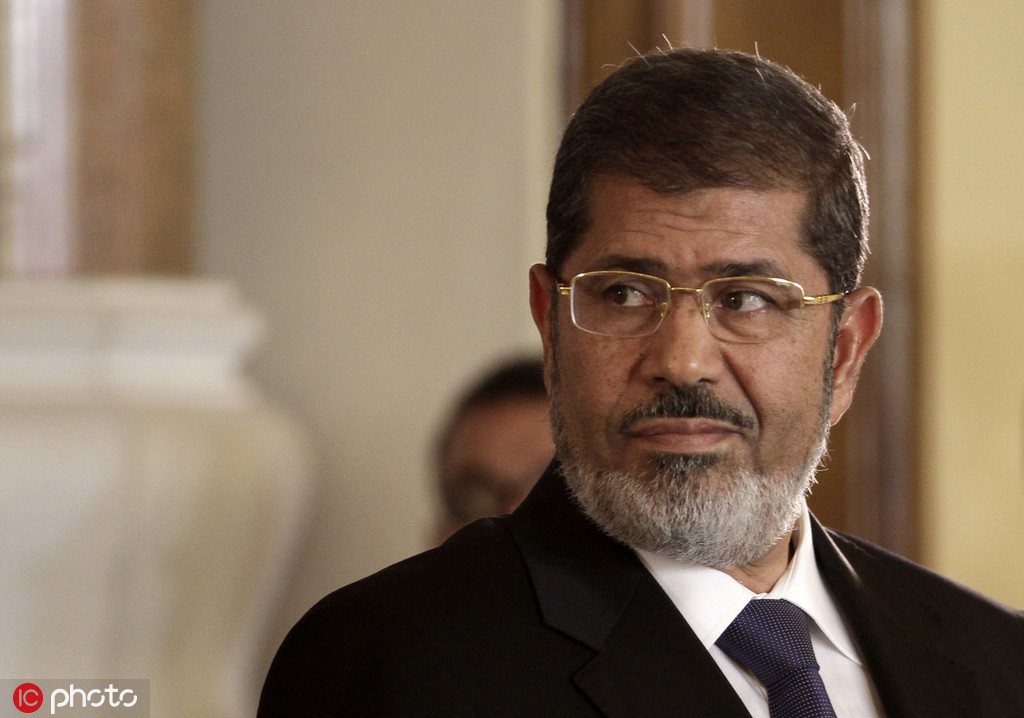
Egypt's former president Mohamed Morsi holds a news conference with Tunisian President Moncef Marzouki, at the Presidential palace in Cairo, Egypt on July 13, 2012. (Photo: IC)
CAIRO - Egypt's former president Mohammed Morsi was buried early on Tuesday, a day after his collapse and death inside a Cairo courtroom following the conclusion of a trial session in an espionage lawsuit.
Morsi's family attended funeral prayers in the mosque of Cairo's Tora prison, followed by the burial at a cemetery in the city's eastern district of Nasr City, said Abdul-Moneim Abdel-Maqsoud, a member of Morsi's defense team.
Morsi's son, Ahmed, said his father was interred at a Cairo cemetery dedicated to prominent Islamists.
Morsi, 67, hailed from Egypt's largest Islamist group, the now outlawed Muslim Brotherhood, and was elected president in 2012 following the ouster the year before of longtime leader Hosni Mubarak.
Morsi was ousted by the army in 2013 in response to mass protests against his rule. Critics accused the Brotherhood of using violence against opponents and seeking to monopolize power and Islamize the state. Massive protests grew against Morsi's rule, until the military - led by then-defense minister Abdel-Fattah el-Sisi - ousted Morsi, dissolved parliament and eventually banned the Muslim Brotherhood organization. Sisi was elected president and reelected last year.
Since 2013, Morsi and top leaders of the Muslim Brotherhood have been kept in prison, facing trials over charges of murder, violence and spying.
Morsi was serving a 20-year jail sentence for inciting deadly clashes between his supporters and opponents in late 2012, and a 25-year jail term for leaking classified documents to Qatar. He denied all these charges.
On Monday, Morsi was attending a retrial session in Cairo criminal court along with 22 other people.
Local media said the former president had suffered a heart attack in the courtroom.
"The former president had asked to speak and the judge gave him the permission," state TV reported, adding that Morsi fainted later and was taken to hospital.
Nabil Sadek, the public prosecutor, said in a statement that Morsi collapsed in a defendants' cage in the courtroom after speaking for five minutes and was pronounced dead at the hospital at 4:50 pm.
"The initial medical examination of Morsi showed that he had no pulse, no indications of breathing and his eyes were open and unresponsive to light or stimuli," the statement said.
An autopsy showed no signs of recent injury on his body, Sadek said. The prosecutor ordered an examination of Morsi's body, footage from surveillance cameras at the court, as well as an investigation of those who were present at the time of Morsi's death.
Turkish President Recep Tayyip Erdogan, Qatari Emir Sheikh Tamim bin Hamad Al-Thani and the Palestinian Islamist group Hamas paid tribute to Morsi and Iran expressed regret over Morsi's death.
On Tuesday, Egypt's authorities also criticized a Western human rights advocate over her comments following Morsi's death.
Sarah Leah Whitson, Middle East director with Human Rights Watch, criticized the Egyptian government's "failure to allow him adequate medical care, much less family visits".
Egypt's state information service said Whitson's statements were "nothing but false claims" and reaffirm what it called the organization's tradition of "circulating lies".
The service added that a court had approved Morsi's medical request in 2017 asking that he be "treated at his own expense".


